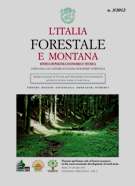Potentialities and uncertainties of novel agroforestry systems in the European C.A.P.: farmers’ and professionals’ perspectives in Italy
Published 2013-04-24
Keywords
- silvo-arable systems,
- on-farm survey,
- EU policy,
- participative approach,
- rural development.
Copyright (c) 2012 Italian Journal of Forest and Mountain Environments

This work is licensed under a Creative Commons Attribution-NonCommercial 4.0 International License.
Abstract
Agroforestry systems are traditional land use practices widely evident in different agro-ecological environments. In Mediterranean areas they comprised the most important cultural models until the introduction of modern industrialised agriculture. Further, the Common Agricultural Policy (CAP) of the EU has dramatically promoted agricultural monocultures, with detrimental effects on agroforestry systems. Consequently, both tree presence across agricultural lands and the associated biological diversity have been progressively reduced. Recent research activities have highlighted interesting potentialities of modern agroforestry systems (silvo-arable systems) based on the intercropping of high quality timber species with arable crops. At present, CAP recognises agroforestry as sustainable land use practice and the current Rural Development Plans (RDP) are promoting novel agroforestry systems at farm level through the measure 2.2.2. The overall aim of the paper was to assess the potential interest in establishing and adopting silvoarable agroforestry systems at farm level. In order to reach this aim, the paper combined two different surveys: i) an on-farm survey was utilised to investigate farmers’ point of view concerning the adoption of silvo-arable systems in their farmlands in Central and Northern Italy; ii) an e-mail survey addressed to professional technicians, working as consultants in two Italian Regions (Umbria and Veneto), was utilised to evaluate their professional experience dealing with agroforestry and their attitude to promote agroforestry systems according to the measure 2.2.2 of the RDP. The results highlight the potential interest of farmers in establishing silvo-arable systems, although management constraints and economic uncertainty may strongly limit their effective adoption. From the point of view of the professionals, a lack of extension and training activities concerning agroforestry practices inhibits farmers’ participation in the measure 2.2.2. Finally, the contrast between measure 2.2.2 and the current CAP, based on the Single Farm Payment, is discussed.

